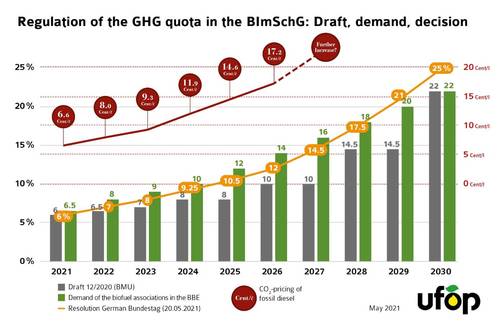GHG quota law strengthens demand for rapeseed
Berlin, June 21, 2021. With the law on the „Further Development of the Greenhouse Gas (GHG) Quota“ passed in the German Bundestag on May 21, 2021, an ambitious increase in the GHG reduction obligation from 6% today to 25% in 2030 was agreed. This strengthens demand for sustainably grown biomass feedstocks such as rapeseed. Existing biodiesel plants are expected to switch to rapeseed according to the Union for the Promotion of Oil and Protein Plants e.V. (UFOP), existing biodiesel plants will be dependent on rapeseed oil. In the short term, the demand for rapeseed oil for biofuel production will increase, and not only in Germany.
With the Act on the Further Development of the GHG Quota, which was passed on May 21, 2021, the German government has implemented the new version of the Renewable Energies Directive (RED II - 2018/2001/EC) into national law. The central component is the ambitious increase in the GHG reduction obligation from 6% today to 7% in 2022 and finally to 25% in 2030. At the same time, the exclusion of biofuels from palm oil provided for by EU law is already brought forward to 2023. For 2022, the share of biofuels from palm oil will be limited to 0.9%. This would strengthen the demand for rapeseed oil.
In 2020, about 3 million tons of biodiesel and hydrogenated vegetable oil (HVO) were needed in this country to meet the GHG quota. Of this, an estimated 1 million t of biodiesel was produced from waste oils. However, with the implementation of RED II in all member states, blending quotas for bio-kerosene (HVO-based) from waste oils will also be introduced. Existing biodiesel plants, however, will have to rely on rapeseed oil, according to UFOP's expectations. In the short term, therefore, the demand for rapeseed oil for biofuel production will increase, and not only in Germany. The increase in the penalty payment from EUR 460 to EUR 600/t CO2 will also significantly increase the pressure on market participants to act and comply.
The past marketing year had made it clear that oil mills would be well advised to offer corresponding advance contracts for sowing in the fall of 2021 in order to secure supplies for the biodiesel industry.
UFOP points out that demand for GMO-free rapeseed meal is also continuing to rise, not least as a result of the critical discussion on deforestation-free feed sourcing.
Rapeseed for biofuel production is certified throughout the entire supply chain, starting from the area under cultivation (submission of self-declaration!) through to use in the tank or trough, emphasizes the UFOP.


 Union zur Förderung von Oel- und Proteinpflanzen E.V.
Union zur Förderung von Oel- und Proteinpflanzen E.V.
